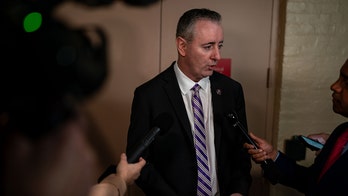Will GOP face backlash if they don't repeal ObamaCare?
Joe Lestingi and Bradley Blakeman on the chances Congress will pass bill against healthcare law
WASHINGTON – Republican lawmakers are facing rising pressure from conservative groups and activists to go big – or potentially go home – in their fight against ObamaCare.
After taking control of Congress thanks to big victories in the November midterms, Republicans who ran in part on their opposition to the law are starting to roll out legislation undoing pieces of it. But the party is stuck in an internal debate over how far they can really go – risking a potential backlash from the party’s right flank if they don’t go far enough.
Tea Party activists say they are frustrated with the pace of progress toward conservatives’ goal of upending the Affordable Care Act.
Some activists are encouraging members to “fax blast” all 435 House members and 100 senators and demand they “drive a stake through the heart of ObamaCare once and for all.”
Some Tea Party-backed lawmakers like Texas Sen. Ted Cruz are leading the charge against the Affordable Care Act. The senator, and potential presidential candidate, recently warned that Republicans will “get walloped” in 2016 if they don’t live up to their promises, including working to get the health law eliminated.
But so far, several Republican lawmakers, like Senate Finance Committee Chairman Orrin Hatch, R-Utah, have indicated they’d have better luck chipping away at the law “piece by piece.”
On Wednesday, Hatch and Sen. Lamar Alexander, R-Tenn., introduced legislation to repeal the health care law’s individual mandate requiring most people to obtain insurance. The legislation, called the American Liberty Restoration Act, is backed by 20 GOP senators.
"This legislation strikes ObamaCare’s individual mandate and restores the freedoms outlined in the Constitution,” Hatch said in a written statement.
Hatch and a group of bipartisan senators also are pushing a bill to scratch the law’s controversial 2.3 percent tax on medical devices.
Several conservative activists and commentators in recent weeks have urged the new Republican Congress to be aggressive. Since right after the election, Brent Bozell, chairman of the conservative ForAmerica group, has said the Republican majority “must” keep its “promise” to pass a full repeal bill, if only to force a presidential veto.
If they don’t, it raises the possibility not only of turbulence for GOP congressional candidates in 2016 but a groundswell of anti-ObamaCare pressure in the presidential primaries and caucuses.
In the official Republican response to the State of the Union address, Sen. Joni Ernst, R-Iowa, vowed that the party will “keep fighting to repeal and replace a health care law that's hurt so many hardworking families.”
Freshman Sen. Bill Cassidy, R-La., also has called for Congress to go after the law and is among many GOP lawmakers who have signed a pledge calling for its repeal. He recently told The Hill, “There is a tide rising” against the health law.
But like Hatch, he has put forward bills repealing the medical device tax and the individual mandate – parts of the law, not the whole thing.
Party strategists have questioned whether aiming for full repeal is worth the effort, when President Obama would surely veto.
“Republicans should not, again, go down the road of full repeal for ObamaCare when they know the president’s not going to have an epiphany and say, ‘You know what? I screwed up. Yeah, let’s repeal my legacy legislation,’” Republican strategist Brad Blakeman told FoxNews.com.
Top GOP lawmakers have been unclear about their intentions.
For the most part, GOP leaders still say they want to repeal the law but have focused on piecemeal bills and other pressing matters, ranging from immigration to the Keystone XL pipeline.
Last week, during a Republican retreat in Pennsylvania, Wisconsin Rep. Paul Ryan, chairman of the House Ways and Means Committee, called ObamaCare a “terrible law” that’s “beyond repair” and needs to be replaced. Ryan, however, did not offer a timeline for doing so.
Lara Brown, director of the political management program at George Washington University, says frustration with the GOP caucus is ill-placed.
“I think that Republicans have the ability to say to their base that ‘we can only move as fast as our political power allows’ and the reality is that they don’t yet have the White House,” Brown told FoxNews.com. “The reality is you still need 60 votes to get a bill through the Senate. Republicans have to be very calculated, and they don’t want to burn any bipartisan bridges.”
She predicted there would not be a huge backlash for the party if they don’t confront the law head-on, because Republicans can easily remind voters that they did not win the White House in 2012.
An X-factor in Republicans’ strategy is a pending Supreme Court case. The court in March is slated to hear a case that questions the legality of the subsidies that are at the heart of the Affordable Care Act. That’s got Republican lawmakers crafting a game plan in case the court creates an opening to push an alternative health overhaul (though the Obama administration has voiced confidence in their case).
Blakeman said Republicans should attack ObamaCare strategically.
“We have a lot of Democratic support. Let’s fix that which is broken until Obama is out of office,” he said. “Let’s get a Republican in the White House and then we can talk about serious overhaul almost completely of ObamaCare or outright strike it down.”
Democratic strategist Joe Lestingi said Republicans, though, lose by waiting – as Americans grow used to the law.
“[ObamaCare] is going to become more popular and by the time we get a Republican president, this thing is going to be well ingrained in society,” Lestingi told FoxNews.com. “People will be used to this program. People will like the coverage they have and it will be really hard for Republicans to overturn.”
The Republican-controlled House has voted more than 50 times to repeal or defund all or parts of ObamaCare. None of those bills, however, were considered by the Senate, which was controlled by Democrats until this month.





